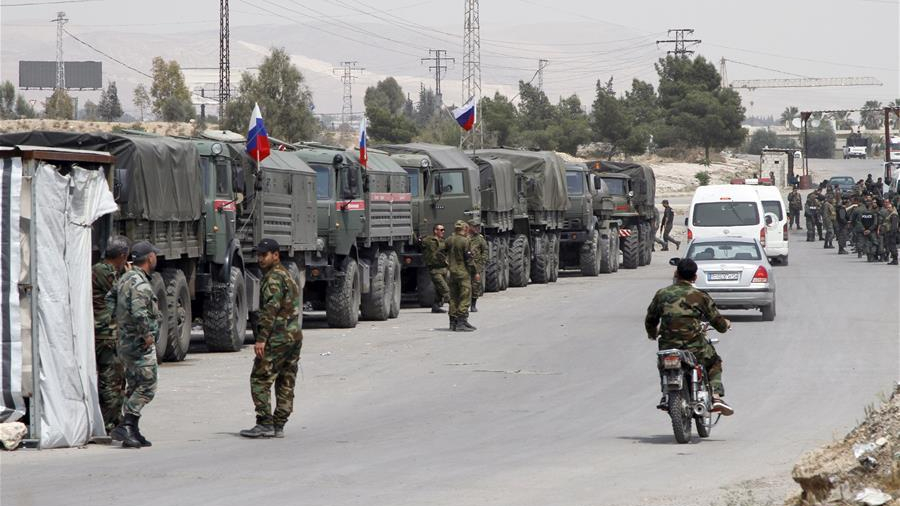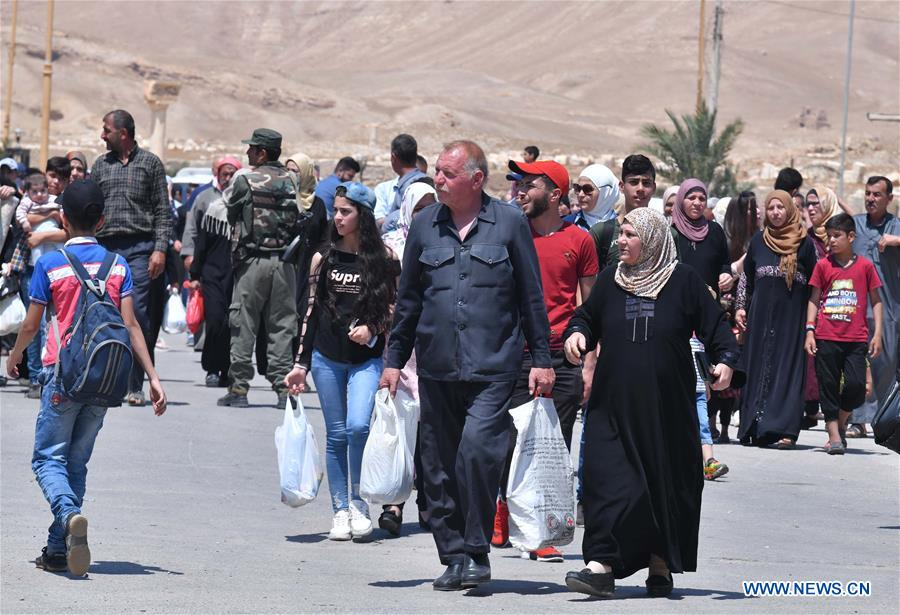
Russian military police forces are seen at the Wafideen area near the town of Douma, on the northeast of Damascus, Syria, on April 12, 2018. /Xinhua Photo
Russian military police forces are seen at the Wafideen area near the town of Douma, on the northeast of Damascus, Syria, on April 12, 2018. /Xinhua Photo
Editor's note: Freddie Reidy is a freelance writer based in London. He studied history and history of art at the University of Kent, Canterbury, specializing in Russian history and international politics. The article reflects the author's opinions, and not necessarily the views of CGTN.
The situation of northern Syria was on a knife edge as rival regional powers squared up and a power vacuum developed last October, but the current circumstance is far more stable. Things are looking positive from a Russian perspective, losses are down and Russian influence reasserted. Is it possible therefore, that Russia will be viewing its campaign in Syria as a success?
The Syrian crisis has been ongoing for nine years and has claimed the lives of over 400,000 and has displaced over six million Syrians. It is therefore somewhat hollow to herald any involvement in such a crisis as a "success" but the sentiment in the Kremlin would very much suggest this is the case.
Syria had not been a country on the radar of the United States during the Arab Spring, the U.S. essentially relying on Israel for intelligence on the area. The Obama administration's main focus was Libya. When violence erupted in Syria therefore, an opportunity presented itself to Russia.
Ever since the Soviet withdrawal from Afghanistan in 1988, Russia had seen diminishing influence in the Middle East. Strong U.S. relations with Israel and heavy involvement in Iraq and Afghanistan had left Moscow on the side lines. The Moscow-friendly government of Bashar al-Assad was, consequently, a vital piece on the board for President Putin.
Preserving the status quo in Syria therefore became a priority and after several periods of extreme volatility that position looks increasingly more assured. The northern province of Idlib is now the final redoubt for anti-Assad forces. These remaining rebel forces also have very different identities and backers. Some groups being supported by Al-Qaeda such as the "Guardians of Religion" and other jihadist fighters such as the Turkistan Islamic Party.
The other major player in the region is the Turkish-backed National Front for Liberation (NLF) but it is the other groups which have led to the rest of the world turning a blind eye. The Russian government are able to portray their regional involvement as part of a global effort to rid the world of terrorism. While the West are reluctant to endorse this effort, it does provide sufficient scope to "leave the Russians to it". Something many a Washington politician is keen to do after drawn out engagements in Iran and Iraq.

Syrian people are seen returning to their city of Palmyra in central Syria on June 14, 2019. /Xinhua Photo
Syrian people are seen returning to their city of Palmyra in central Syria on June 14, 2019. /Xinhua Photo
The desired taking of Idlib does pit Russian and pro-Assad forces against NLF fighters backed by Turkey. President Erdogan's prime motivation is to rid Kurdish influence from the north of Syria and on the Turkish boarder. An aim which is at odds with Assad's wider goal of taking control of the region.
Putin's strong relationship with Erdogan is likely to prove equal to the task though despite setbacks last week. Trade and energy cooperation is a tantalizing lure in securing a lasting peace, a peace which must prevent further Syrian migration into Turkey if Erdogan is to be successful in upcoming elections.
For those in Idlib, there seems little prospect of being able to surrender to Assad without running an incredibly high risk of reprisal. There appears to be a desire for Idlib to become a semi-autonomous zone accounting for only one percent of Syrian landmass.
While this could be a solution to the 900,000 Syrians on the move there, the fractured power structure is sure to make any negotiation impossible. Something compounded by Russia's deputy foreign minister's statement that "we can not put up with the presence of a nest of terrorism on Syria's national territory" and "There can be no ceasefire with them as far as they are terrorists. And they are."
President Putin is likely to play a pragmatic hand here and confine Russia's involvement to a military operation and perhaps suggest a reconciliation mechanism for the population of Idlib as a preferable alternative to continued Turkish military presence.
Withdrawing from Syria after the conclusion of hostilities will likely draw to a close successful campaign for Russia. Moscow will have been able to have demonstrated its regional credentials, affirmed alliances and also trained and tested her military capabilities with comparatively little loss.
In the face of indecisive leadership from the U.S. and her allies, Syria has also allowed Russian relations with Turkey to further develop. This ability to operate outside of U.S. control is sure to incense Washington and further erode Turkey's NATO status; marking another foreign policy success for Moscow.
(If you want to contribute and have specific expertise, please contact us at opinions@cgtn.com)